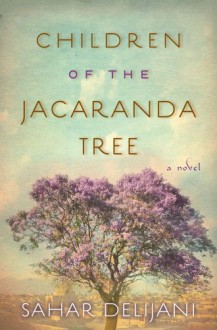 3.5/5
3.5/5Both of my parents experienced war first-hand. Countless hours have been spent with my parents talking to me about their childhoods, how war influenced them, their separation from their families, how they ended up in Canada, and yes, why I should be grateful that I didn't need to go through what they did. The moment that hit me the hardest in
Children of the Jacaranda Tree was in the final chapter, when a girl named Neda laments the fact that the children of Iran are not mere witnesses to their country's history. They, along with their parents, are the historymakers; the horrors of their parents' pasts have bled through to the future.
Children of the Jacaranda Tree is a poignant look at post-revolutionary Iran, and jumps back and forth through time from the early 1980's to the present. It begins with a woman who gives birth to a beautiful baby girl in the darkness of a prison. The stories in this book are intricately interconnected. Many of the stories are heart-wrenching, as one can expect from a book taking place in a tumultuous time in Iranian history. This novel deals with love, with loyalty, with loss, with freedom.
The story of Amir is one that will stick with me the most- he a young man serving a jail sentence. Before this, I did not know that atheism was subject to the death penalty in Iran- this was the one thing that Amir pleaded not-guilty to. Amir has a baby daughter, and the author captures the anguish of being separated from family very well. With great resourcefulness, Amir gives his daughter a gift to represent his love, and waits for his jail term to be complete, anticipating the prospect of being with his wife and child once again. Needless to say, there is more to his story, which I will leave to readers to discover.
The greatest strength of this novel- the intergenerational depiction of Iran- also, unfortunately, serves to be its weakness. Although the author makes a valiant attempt to connect characters within the novel, as the novel goes on, it gets increasingly difficult to recall who the characters were and what role they played earlier in the novel. For instance, a character who is secondary in the first segment and is a cellmate, will become a primary- or another secondary- character in a later segment. A child with little plot significance will become an adult with a main story, so on and so forth. The overall cohesion of the book suffers a bit because of the awkward breaks needed to flip back and forth in an effort to remember who a certain character was in an earlier tale. As a result, the supporting characters lack the necessary substance needed to make them memorable. In addition, occasionally, it is difficult to determine the timeline when the date is not given.
I found that I was personally not entirely satisfied with the prose style. For instance, the similes/metaphors were hit-and-miss for me; some comparisons just didn't quite work. Other than that, I got used to the prose style as the novel progressed, and there were several passages that were simply beautiful.This is the author's debut novel, and she definitely has potential.
As shown by the title, the 'Jacaranda tree' serves as the novel's main symbol. Although it is fairly ostentatious, it would make for interesting analysis. It should also be noted that the pacing of this book is a little awkward; the first fifty pages or so were very strong, but it dragged a bit at certain sections within the book. The pacing is effective in the sense that it allows the reader to explore the setting and environment (which is likely what the author is going for anyway), so this is isn't too big an issue.
Overall, I think that this is a very strong debut novel from this author. I can see it in high school classrooms as a book to study, especially in a time when books with subject matter dealing with developing countries is gaining traction. Sahar Delijani, the author, is obviously passionate about Iran, and this passion does shine through in her writing.
(I also have to note that the cover of this book is stunning.)
Entertainment value: 3.5/5
Writing quality/style: 3.5/5
Readability: 2/5 (5 being the most difficult to read)
Characters (depth/development): 2.5/5
Plot: 3.5/5
I received an ARC of this through the Goodreads First Reads program. This has not influenced my opinions about the book in any way.


 Log in with Facebook
Log in with Facebook 







